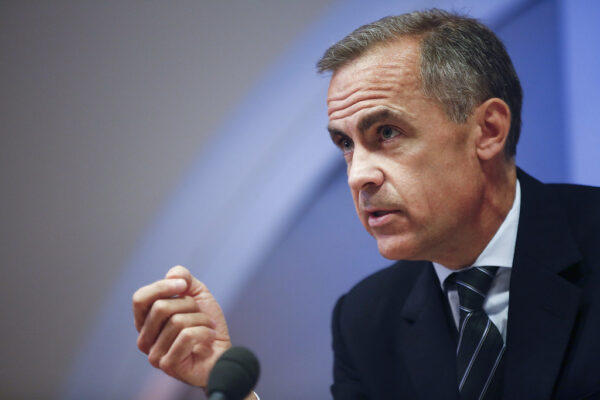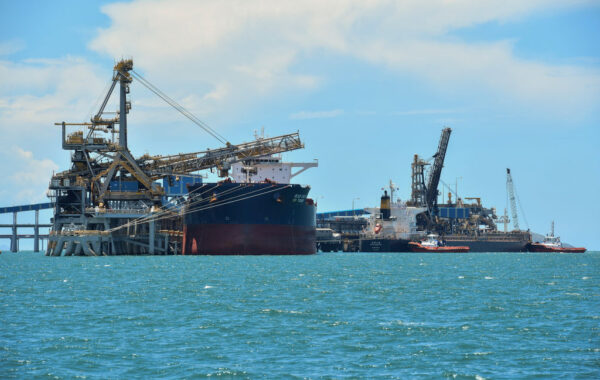Carney’s ‘net-zero’ investment firm has billions in coal and oil sands projects
The UN climate finance envoy said Brookfield, which he joined last year, is net zero ‘across its portfolio’

A Canadian company that employs UN climate finance envoy Mark Carney as vice-chair has invested billions of dollars in fossil fuel projects, including a coal port and an oil sands pipeline.
Mark Carney, the former governor of the Bank of England, is now Boris Johnson’s finance adviser for the COP26 climate summit in addition to his high-profile role for the UN. He joined Brookfield Asset Management last August with special responsibility for environmental, social and governance issues.
Earlier this month, Carney told Bloomberg TV that Brookfield is “net zero across its $575 billion asset portfolio”. He said that although Brookfield owns companies “across the spectrum”, it has achieved net-zero status because “we have this enormous renewables business that we’ve built up and all of the avoided emissions that come with that.”
But an Unearthed analysis has identified five major fossil fuel infrastructure projects in which Brookfield is a leading shareholder, including significant projects in the highly polluting coal and oil sands sectors.
Bill Hare, director at Climate Analytics, an NGO, warned that offsetting fossil fuel projects against “avoided emissions”, as Carney appeared to do, was “not a reasonable definition of net zero”.
The fossil fuel projects identified by Unearthed are:
With a 49% stake worth an estimated $600 million, Brookfield is the largest shareholder in the coal terminal. The port primarily deals in coal burned for steelmaking, an industry which is harder to decarbonise than the power sector but Hare argued: “We know that metallurgical coal also needs to be phased out relatively quickly and replaced by clean alternatives using, for example, green hydrogen and that investments to increase the potential for this are badly needed.”
Alongside Kinder Morgan, Brookfield is the joint-largest shareholder in the Natural Gas Pipeline Company of America, which runs pipelines from the Gulf of Mexico and the Permian Basin in Texas to Chicago. The firm holds 37.5% of the company.
Brookfield reportedly currently owns 20% of the oil sands pipeline operator and is in the midst of a hostile takeover of the company, aiming to buy the remaining shares. The Financial Post said Brookfield is “spending billions of dollars buying up hydrocarbons infrastructure in Western Canada.” In 2020, Brookfield Infrastructure generated 15% of its cash flows from its midstream business, including the Inter Pipeline.
Brookfield is part of a consortium of financial institutions that have taken a 49% stake (worth $10 billion) in the Abu Dhabi National Oil Company’s gas infrastructure.
Brookfield acquired the pipeline – which carries gas from the country’s south east to Gujarat in the west – for $2 billion in 2019, taking 90% of the equity.
A spokesperson for Brookfield, citing this shareholder letter, told Unearthed: “Within the envelope of net-zero carbon, we will continue to own and operate certain essential infrastructure assets globally that transport fuel.”
Brookfield wrote to its shareholders that it operated these assets “with their contributions to the transition to net-zero carbon in mind and with plans to ensure they continuously do better.” The company added: “We believe the operating experience we have gained in transitioning from carbon-intensive to net-zero carbon ourselves will make us better owners of many of these assets.”
Hours after Unearthed and Bloomberg stories had prompted an outcry on social media, Carney issued a statement in which he reiterated his support for net zero science-based targets, which he said avoided emissions do not count towards.
On the critical role of renewables and science-based targets in winning the race to net zero, please see my statement. @Brookfield pic.twitter.com/Vufa0rWN1L
— Mark Carney (@MarkJCarney) February 26, 2021
Wolfgang Kuhn, director of financial sector strategies at NGO ShareAction, told Unearthed: “Net-zero is quickly becoming a useless concept: every time it is brought into play to justify the continued financing of carbon emissions, it becomes a little more hollow.
“There is no netting when it comes to the carbon budget: a ton of carbon put in the atmosphere is a ton of carbon in the air. Generating energy – even if renewable – does not remove greenhouse gases from the atmosphere, so it is absurd to say that investments of this nature offset investments in fossil fuel infrastructure.”
“The concept of ‘avoided emissions’ has no place in a Paris-aligned strategy.”

What is net zero?
The question of whether a financial firm can claim to be net zero whilst still investing in assets that facilitate the use of fossil fuels, not least the most polluting kinds like coal and oil sands, is a live issue going into the COP26 climate summit due to be held in Glasgow in November.
As Carney said, Brookfield has significant holdings in renewable energy, which vastly outstrip its fossil fuel investments.
But the claim that these green projects and their “avoided emissions” offset the carbon produced by its other assets, allowing it to claim net-zero status, is controversial.
Bill Hare of Climate Analytics told Unearthed: “I don’t think this version of net zero is consistent with the Paris Agreement, either in spirit or in terms of the letter of the law.
“From the point of view of the atmosphere, to be net-zero across a portfolio at present means that your actual physical emissions from that portfolio would need to be offset by real, additional, verifiable and permanent removals somewhere else. And this should be done in a transparent manner – tell us what the contribution from removals is, don’t hide it in a netted number.
“Rushing to make emissions ‘look’ like zero when they are not will ultimately be counter-productive and erode market and consumer confidence.”
In his Bloomberg interview, Carney clarified: “Just because we’re net zero doesn’t mean everything’s green.”
“We have assets that span the spectrum and we have a commitment that we will manage those assets and work to decarbonise those assets over time very transparently and provide the information that the market needs in order to judge that.”
There is anxiety in the financial sector over Carney’s use of the term, concerned that other banks may use this disputed argument to make similar claims while continuing to fund projects that support the fossil fuel industry.
Hare concluded: “I don’t think this is a reasonable definition of net zero using avoided emissions from a counterfactual baseline to offset actual emissions. This could begin to look like a giant carbon Ponzi scheme.”
Updated to include Carney’s statement

